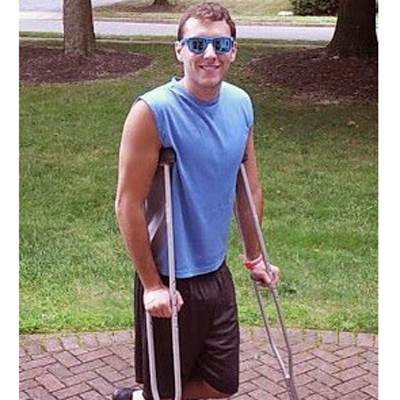Why I Launched a Startup While Disabled
Four years ago, I was wheeled out of Penn’s hospital, my knee the size of a melon. I had been cut open by orthopedic surgeons, and they had removed sharp bone growths from inside my tendons. I went through this process again and again, but the bone growths returned again and again, until I decided more surgery just made me worse. Since that day, I have been unable to walk more than a block or two.
For years I used a cane. Last winter, I could not leave my house. I have seen about 30 doctors. I have been diagnosed with everything from plantar fasciitis to neuromuscular diseases like multiple sclerosis. The truth is, my doctors can’t be sure what is hurting me. I know that I’ve had my mobility severely restricted for years. I can’t walk to the bathroom, I can’t grocery shop, I can’t wear dress shoes, I can’t stand for a few minutes to have a chat.
Naturally, I thought this was a great time to launch a startup … after one of my surgeries. The painkillers hadn’t even worn off yet.
With my classmate Olivia Bonitatibus, I started Numo, the smart math camera. Our app allows users to take a picture of a math problem then outputs step-by-step explanations to show them how to solve the problem.
Along the way, I’ve had a unique startup experience. My story is not one of single-minded determination overcoming difficult odds. It’s a story of how maddeningly difficult it is to live with a disability.
I couldn’t stand up to talk with investors, so I sat on my cane and grinned through a grimace. The hardest part of pitching was just standing up. When we were invited to demo Numo to Wolfram Alpha in Illinois, flying there was out of the question, because I could not walk through the airport, get to a shuttle or walk through a parking lot. So instead, we road-tripped 15 hours to Wolfram’s Headquarters in Champaign, Ill. I felt stressed from the constant pain and immobility. When something went wrong in the business, my anxiety from my disability would make it feel much worse.
I stuck with it because my teammates — Olivia, and over time, Michael Arrigo, Chris Chike, Brian Tung, and George Chliovas — all understood my condition. They made me feel welcome and accommodated my needs, even when that meant wheeling me to meetings in an office chair.
Disability taught me two invaluable lessons about starting a company. The first was improvisation. With a disability, I can’t do things how other people do them. I have to get them done in whatever awkward and quirky way works for me. Since Numo is a bootstrapped company, we get results with whatever resources we have on hand. We can’t splurge on expensive enterprise software or paid marketing, so we find free alternatives. We can’t hire experts in every field, so we learned accounting, contract law, and mobile marketing. The second lesson was dealing with calamity. I thought the world would end if I became disabled. It didn’t. I adapted to and enjoyed the life I had. With Numo, we thought the world would end every time we lost a deal, consumer demand shifted, or a competitor emerged. Disability let me see that life goes on after catastrophic events. The best thing to do is pick up the pieces and try to thrive in that new world.
I’m working hard in physical therapy to regain much of the mobility I lost. But even if that doesn’t happen, I’ll always know it’s possible to start a company while disabled.
Tim Dugan is the founder of the math homework app Numo. At age 15, his classroom spats with teachers boiled over and he started a math tutoring service, later expanding to the SAT. He has developed learning programs that can make jocks look like nerds and get kids into way better colleges than their GPAs deserve. After surviving the deep-fried-pressure-cooker that is UPenn, Tim brought his friends together to create Numo to help anyone become a math person.




